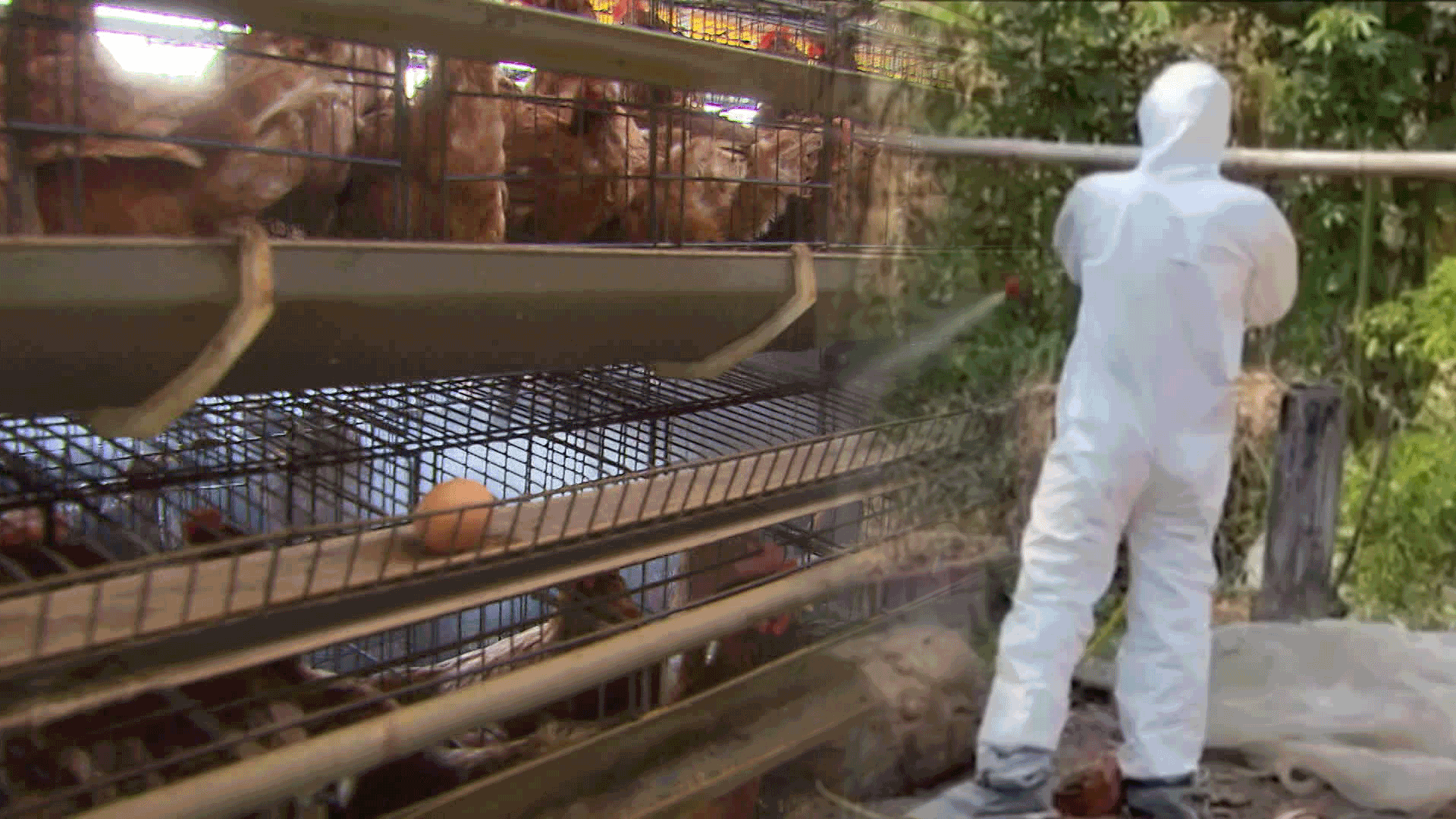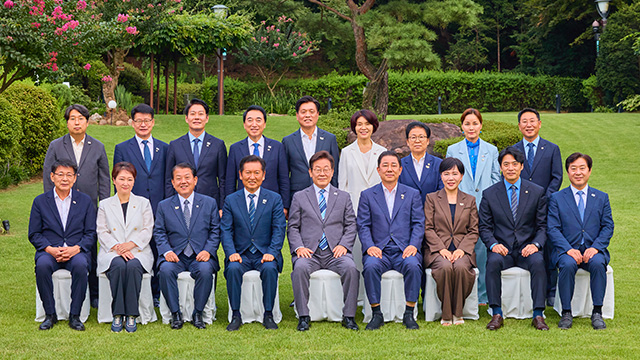[Anchor]
Cases of human infection with the avian influenza virus, AI, are occurring in various parts of the world.
In South Korea, there is only one AI vaccine that was approved 10 years ago, and KBS's investigation has confirmed that it is ineffective against the currently circulating virus.
This is a special report by Hong Seong-hee.
[Report]
Since June, 8 people in Cambodia have been infected with avian influenza, AI, resulting in 2 deaths.
So far this year, there have been 24 cases of AI infection across 8 countries, with 8 of them dying from respiratory distress.
No human infection cases have been found in South Korea yet.
However, due to concerns about a second pandemic, health authorities decided to stockpile AI vaccines last year.
In South Korea, there is only one AI vaccine developed by a pharmaceutical company and approved 10 years ago.
However, none of this vaccine is stockpiled.
We obtained and reviewed the results of tests conducted by the Korea Disease Control and Prevention Agency to see if this vaccine is effective against the currently circulating AI virus.
The research team injected animals with the virus used during the vaccine development 10 years ago to produce 'antibodies.'
When these 'antibodies' were tested with the currently circulating AI virus, the results showed levels below the standard threshold.
This means that the vaccine is ineffective. (Provided by the office of Kim Yoon, a member of the Democratic Party)
[Choi Won-seok/Professor of Infectious Diseases at Korea University Ansan Hospital: "Even if the H5N1 type is the same, there are some differences in the detailed genetic characteristics compared to the viruses that occurred in the past and the recent ones in American dairy farms."]
For now, the only option is to purchase AI vaccines from abroad, but the budget requested by the Korea Disease Control and Prevention Agency in the second supplementary budget in June was not reflected.
Experts point out that there is a sufficient possibility of AI viruses capable of human infection entering South Korea, and that the stockpiling of vaccines should be expedited.
This is Hong Seong-hee from KBS News.
Cases of human infection with the avian influenza virus, AI, are occurring in various parts of the world.
In South Korea, there is only one AI vaccine that was approved 10 years ago, and KBS's investigation has confirmed that it is ineffective against the currently circulating virus.
This is a special report by Hong Seong-hee.
[Report]
Since June, 8 people in Cambodia have been infected with avian influenza, AI, resulting in 2 deaths.
So far this year, there have been 24 cases of AI infection across 8 countries, with 8 of them dying from respiratory distress.
No human infection cases have been found in South Korea yet.
However, due to concerns about a second pandemic, health authorities decided to stockpile AI vaccines last year.
In South Korea, there is only one AI vaccine developed by a pharmaceutical company and approved 10 years ago.
However, none of this vaccine is stockpiled.
We obtained and reviewed the results of tests conducted by the Korea Disease Control and Prevention Agency to see if this vaccine is effective against the currently circulating AI virus.
The research team injected animals with the virus used during the vaccine development 10 years ago to produce 'antibodies.'
When these 'antibodies' were tested with the currently circulating AI virus, the results showed levels below the standard threshold.
This means that the vaccine is ineffective. (Provided by the office of Kim Yoon, a member of the Democratic Party)
[Choi Won-seok/Professor of Infectious Diseases at Korea University Ansan Hospital: "Even if the H5N1 type is the same, there are some differences in the detailed genetic characteristics compared to the viruses that occurred in the past and the recent ones in American dairy farms."]
For now, the only option is to purchase AI vaccines from abroad, but the budget requested by the Korea Disease Control and Prevention Agency in the second supplementary budget in June was not reflected.
Experts point out that there is a sufficient possibility of AI viruses capable of human infection entering South Korea, and that the stockpiling of vaccines should be expedited.
This is Hong Seong-hee from KBS News.
■ 제보하기
▷ 카카오톡 : 'KBS제보' 검색, 채널 추가
▷ 전화 : 02-781-1234, 4444
▷ 이메일 : kbs1234@kbs.co.kr
▷ 유튜브, 네이버, 카카오에서도 KBS뉴스를 구독해주세요!
- [Exclusive] AI vaccine ineffective
-
- 입력 2025-08-02 01:08:12

[Anchor]
Cases of human infection with the avian influenza virus, AI, are occurring in various parts of the world.
In South Korea, there is only one AI vaccine that was approved 10 years ago, and KBS's investigation has confirmed that it is ineffective against the currently circulating virus.
This is a special report by Hong Seong-hee.
[Report]
Since June, 8 people in Cambodia have been infected with avian influenza, AI, resulting in 2 deaths.
So far this year, there have been 24 cases of AI infection across 8 countries, with 8 of them dying from respiratory distress.
No human infection cases have been found in South Korea yet.
However, due to concerns about a second pandemic, health authorities decided to stockpile AI vaccines last year.
In South Korea, there is only one AI vaccine developed by a pharmaceutical company and approved 10 years ago.
However, none of this vaccine is stockpiled.
We obtained and reviewed the results of tests conducted by the Korea Disease Control and Prevention Agency to see if this vaccine is effective against the currently circulating AI virus.
The research team injected animals with the virus used during the vaccine development 10 years ago to produce 'antibodies.'
When these 'antibodies' were tested with the currently circulating AI virus, the results showed levels below the standard threshold.
This means that the vaccine is ineffective. (Provided by the office of Kim Yoon, a member of the Democratic Party)
[Choi Won-seok/Professor of Infectious Diseases at Korea University Ansan Hospital: "Even if the H5N1 type is the same, there are some differences in the detailed genetic characteristics compared to the viruses that occurred in the past and the recent ones in American dairy farms."]
For now, the only option is to purchase AI vaccines from abroad, but the budget requested by the Korea Disease Control and Prevention Agency in the second supplementary budget in June was not reflected.
Experts point out that there is a sufficient possibility of AI viruses capable of human infection entering South Korea, and that the stockpiling of vaccines should be expedited.
This is Hong Seong-hee from KBS News.
Cases of human infection with the avian influenza virus, AI, are occurring in various parts of the world.
In South Korea, there is only one AI vaccine that was approved 10 years ago, and KBS's investigation has confirmed that it is ineffective against the currently circulating virus.
This is a special report by Hong Seong-hee.
[Report]
Since June, 8 people in Cambodia have been infected with avian influenza, AI, resulting in 2 deaths.
So far this year, there have been 24 cases of AI infection across 8 countries, with 8 of them dying from respiratory distress.
No human infection cases have been found in South Korea yet.
However, due to concerns about a second pandemic, health authorities decided to stockpile AI vaccines last year.
In South Korea, there is only one AI vaccine developed by a pharmaceutical company and approved 10 years ago.
However, none of this vaccine is stockpiled.
We obtained and reviewed the results of tests conducted by the Korea Disease Control and Prevention Agency to see if this vaccine is effective against the currently circulating AI virus.
The research team injected animals with the virus used during the vaccine development 10 years ago to produce 'antibodies.'
When these 'antibodies' were tested with the currently circulating AI virus, the results showed levels below the standard threshold.
This means that the vaccine is ineffective. (Provided by the office of Kim Yoon, a member of the Democratic Party)
[Choi Won-seok/Professor of Infectious Diseases at Korea University Ansan Hospital: "Even if the H5N1 type is the same, there are some differences in the detailed genetic characteristics compared to the viruses that occurred in the past and the recent ones in American dairy farms."]
For now, the only option is to purchase AI vaccines from abroad, but the budget requested by the Korea Disease Control and Prevention Agency in the second supplementary budget in June was not reflected.
Experts point out that there is a sufficient possibility of AI viruses capable of human infection entering South Korea, and that the stockpiling of vaccines should be expedited.
This is Hong Seong-hee from KBS News.
-
-

홍성희 기자 bombom@kbs.co.kr
홍성희 기자의 기사 모음
-
이 기사가 좋으셨다면
-
좋아요
0
-
응원해요
0
-
후속 원해요
0











![[단독] ‘5천만 원짜리 시계, 모른다’던 김건희…‘고가 가방 영상’ 속 손목 보니](/data/news/title_image/newsmp4/news9/2025/08/20/20_8335377.png)

![[단독] 사고 4달 전 ‘낙하물방지물’ 지적…추락 위험 경고만 수차례](/data/layer/904/2025/08/20250820_fFqQYJ.png)

이 기사에 대한 의견을 남겨주세요.